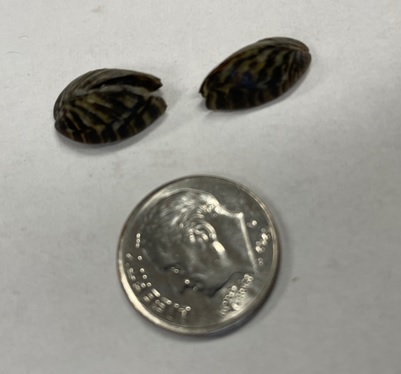
LAKE BROWNWOOD – Earlier this year, on April 27, the Texas Parks and Wildlife Department reported the detection of zebra mussel larvae in plankton samples collected at two sites approximately three miles apart at Lake Brownwood. The samples were taken in November. That was bad news but the news got worse on Tuesday when a boat owner found two adult zebra mussels on his vessel.
“Yesterday afternoon we were informed by a local boat owner that he had found what he thought were zebra mussels on his boat. We actually went and collected the samples that he had found and actually there were two, just two individual zebra mussels. I did confirm through Inland Fisheries, through pictures of them, that yes, they are zebra mussels,” said John Allen, General Manager of Brown County Water Improvement District #1. He continued by saying the boat they were found on had only been in Lake Brownwood but the boat had been in the water since November and not taken out of the water until Tuesday.
“Zebra mussels are a highly invasive, non-native species that cause damage to boats as well as to infrastructure for water supply and control and other facilities using raw surface water,” said Monica McGarrity, TPWD Senior Scientist for Aquatic Invasive Species. “Zebra mussels also negatively impact the ecosystem, competing with native filter feeders and altering the food web and attaching to and harming native mussels. Their razor-sharp shells can litter shorelines and cover underwater hard surfaces, posing a hazard for humans.”
The Brown County Water Improvement District would like the public’s assistance as they want to pinpoint where the mussels are being found.
“We would just like everybody to be on the alert. Please check your boats. When you get your boat out, if you do find zebra mussels on there, please contact Brown County Water Improvement District ( 325-643-2609) or our Lake Patrol division at the lake (325-646-2525) or the game wardens locally,” Allen said.
Even before the finding on Tuesday, the BCWID was already preparing for this day to come.
“We have our engineers working on it now. Eventually, what we’re going to have to do is put in more infrastructure to protect our intakes and our pipelines and our pump stations. These zebra mussels are very invasive. They will attach to any hard surface and when they attach to those hard surfaces they colonize, they will stop up pipelines, they will stop up pumps. We are looking at what we need to do to protect our infrastructure,” Allen said.
Allen said summer fishing and boating activities on Lake Brownwood this year shouldn’t be affected much by the discovery of zebra mussels. But, over time, that may change.
“Eventually, what we hear from most lakes that have zebra mussels, what they’ll do is, they’re feeders. They suck up all the plankton and everything, they will clear the water up which eventually will affect the fish population in the lake. They take away all the little food for the little fish which eventually does affect the big fish. It’s not good news for Lake Brownwood at all,” Allen concluded.
In addition to zebra mussels, the recent heavy rain has the lake more than a foot over spillway. Allen cautioned that there is quite a lot of floating debris in the lake at this time and that boaters should be cautious and stay safe.
Before moving your boat to another lake, call TPWD at (512) 389-4848 for guidance on decontamination. The transport of aquatic invasive species can result in legal trouble for boaters or transporters. Transporting prohibited invasive species in Texas is illegal and punishable with a fine of up to $500 per violation. Boaters are also required to drain all water from their boat and onboard receptacles, including bait buckets, before leaving or approaching a body of fresh water.
Additionally, anyone who spots zebra mussels on boats, trailers or equipment that is being moved should immediately report the sighting to TPWD at (512) 389-4848.
TPWD and partners monitor for zebra mussels in Texas lakes, but anyone who finds them in lakes where they haven’t been found before should report them by emailing photos and location information to [email protected].
A status map showing all lakes where zebra mussels have been found in Texas is online at tpwd.texas.gov/ZebraMussels. For more information on how to properly clean, drain and dry boats and equipment, visit the TPWD YouTube channel for a short instructional video.
Information for marinas and owners of boats stored in the water on lakes with zebra mussels can be found on the TPWD website. To learn more about zebra mussels and other invasive species in Texas, visit tpwd.texas.gov/StopInvasives.
(In the Brownwoodnews.com photo – Shown are the two zebra mussels found on a boat at Lake Brownwood, shown next to a dime for size comparison. They can live out of water for days, so they were likely still alive when the photo was taken Wednesday morning)